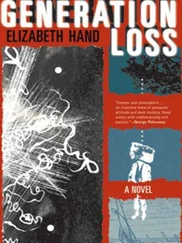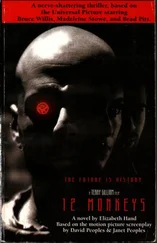Giles shrugged, but his mouth seemed drawn as he replied, “Oh, you would be surprised. Ascendants pass through here more often than you’d think—business with HEL, and there was some trade with the City.”
“Those soldiers, then,” said Jane. “The ones we saw as we were leaving the City. Did they—did they come from here?”
Trevor shook his head. “We don’t accommodate troops. Commanders stay here. Special Agents, Imperators. Ascendant Governors, if they have the need to.”
I shuddered. Had we walked into a trap, then—a house whose owners were in collusion with the very people we were trying to flee? Ascendant Governors. Commanders…
People like the Mad Aviator.
But then why had Trevor told us about the geneslave rebellion at HEL? If Trevor and Giles didn’t share our terror of the Ascendants, neither did they show any support for them. Trevor had worked at HEL, but he had disapproved of its methods and left. And I couldn’t believe that a Paphian—particularly a Saint-Alaban—would ever be in collusion with the Ascendants.
And then I remembered rumors I had heard about the Mad Aviator. It was my first day in the City of Trees. Justice and I were at the house of Lalagé Saint-Alaban; he was begging her for gossip, any news of what had befallen those in the City while he had been an Aide at HEL—
“ There was trouble, Justice. A new Governor was sent here — but the Governors will never hear from him again… .”
That Governor had been Tast’annin. The Curators had learned of his coming, somehow, and had been ready to betray him when he arrived in the City. Who told them? I glanced at Giles, who leaned against the mantel with arms crossed, a thoughtful expression on his amiable face. Then I looked aside at Trevor Mallory, whose family had owned this inn for centuries. I’d seen nothing else standing between here and the City of Trees. Where else would Tast’annin have stayed?
I swallowed, my mouth dry. The thought that they had betrayed him was more unsettling than the notion that they had not. You would have to be very brave, or very powerful, to set yourself against the Ascendant Autocracy. You would have to be insane to go up against Margalis Tast’annin. I took a long sip from my brandy and stared at the floor.
“You knew Tast’annin,” I said at last.
Giles grimaced, baring his teeth like an animal. “It will be the best news we’ve had in a year if we knew him—if he’s really dead, as you say.” He glanced admiringly at Jane, who blushed and looked away.
“He’s dead,” Miss Scarlet said firmly. “Jane has a very good eye.”
I recalled the frequency with which Jane’s pistol misfired but refrained from commenting. “You said janissaries pass through here? On their way to the City?”
Our hosts exchanged a look. Fossa arched his long spine and straightened into the half-crouch that aardmen favor over standing upright. After a long moment Trevor admitted, “Yes. There was a satellite-tracking station near here once, two hundred years ago. It’s gone now but the road’s still there. There were underground bunkers as well, with enough room to house fifty or sixty Aviators. The Ascendants still utilize them sometimes, for training missions.”
“Or for planning an attack on the City of Trees,” said Jane.
Giles nodded.
“And the commanders—they stay here?” My voice sounded accusing.
Trevor shrugged. “We need to supplement what we can grow here for ourselves,” he said coolly, “What other traffic is there, these days? Once or twice a year they come through, give us enough in trade or currency—”
“And news,” cut in Giles.
“And news—enough to keep us going until the next time. For the rest, we trade with the towns to the west—”
“There are towns out here?” Now it was Miss Scarlet who interrupted, but Jane and I were no less amazed.
“Of course!” Giles laughed. “Did you think the world ended at the edge of your City?”
From Miss Scarlet’s expression it was clear that was exactly what she believed. I sat in embarrassed silence, but Jane said curtly, “Well, where does it end, then?”
Trevor looked from Jane to me, eyebrows raised, as if waiting for a joke to be revealed. Finally he said, “Well, it doesn’t. If you mean, Where do the people stop living —well, there are three settlements within a week’s travel from here. Less, if you can get your hands on an autovehicle or aviette.”
“People,” Miss Scarlet murmured, her black eyes huge. “I had no idea.”
“Sperryville and Luray and Cassandra,” said Giles. “There’s more, too, the farther west you go. In the mountains,” he added. “Very strange, those mountains. In Cassandra they live in caves.”
Jane sat up. “Caves! I’d like to see that.”
A low rumble escaped from Fossa. His amber eyes narrowed and for an instant he looked less canine, his mouth drawn into a grin. Then it passed, and his features settled back into their accustomed grimace.
“Not me,” shuddered Miss Scarlet. “We did Macbeth once, set in a sort of cave. It made me quite ill.”
“Cassandra,” I repeated. I frowned and looked at Miss Scarlet, who shook her head.
“I’m afraid it means nothing to me,” she said.
“Never heard of it,” said Jane.
Trevor stood and crossed to the fireplace. He rested his hands on the mantel and absently took one of those odd globes into his hands, caressing it as though he weighed its worth. Only when he turned back to us did I see that what he held was a human skull. On the shelf behind him its fellows stared with gaping eye sockets, as though suddenly betrayed. I was so startled that I spilled my drink.
“The town of Cassandra once housed a research facility,” Trevor pronounced in a deep voice, as though delivering a lecture. “Quite similar to HEL, as a matter of fact, but a much older compound, nestled out there in the mountains. Far enough from the capital that they could carry on their work without fear of contaminating the City’s population, but near enough to be considered part of the whole military-biological complex.”
“What—what did they do?” I stammered.
“Geneslaves. Cassandra was the first facility in North America to carry out bioengineering on a huge scale—for the purpose of pure research, I mean, not merely as a commercial or military venture. Some of the effects created there have never been duplicated.”
As he spoke, the aardman began to make a low noise deep in its throat. The flesh curled back from its mouth, showing sharp white teeth and blackish gums.
“ Burdock,” he snarled.
Giles snapped something, a phrase I didn’t catch, and Fossa grew silent.
Trevor nodded. The firelight sliced through the crook of his arm to touch with dark gold the hollow eyes of the skull he cradled. “It was the home of Luther Burdock. His compound was there, near the caverns.”
He paused, as though waiting for me to show some recognition of the name. Outside, the storm sent branches scraping at the windows, and I could hear the wind screeching like a wild thing trapped in the chimney. I tore my gaze from Trevor’s face and shrugged.
“I’ve never heard of him.”
He turned to Miss Scarlet. “And you?” he asked softly. “Does the name mean nothing to you, Miss Scarlet?”
When I glanced at her, I gasped. The chimpanzee had reared up in Jane’s lap, her lips drawn back in a snarl. Her mane of stiff hair stood straight up, and even from where I sat, I could catch the ammoniac scent of her fear.
“Luther Burdock!” she hissed. Her long fingers flew to her throat and temples, clutching at the thick fur. Beneath the dark hair was a series of raised scars, where long ago Ascendant researchers at the Zoo had performed the experiments that left her with human speech and thought, but imprisoned within the body of a monkey. “His ’files, they made us watch his ’files—”
Читать дальше












